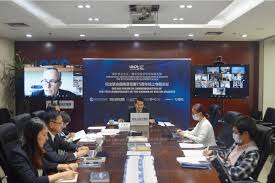“The past is never dead. It’s not even past.” This famous line perfectly suits some U.S. politicians
including Secretary of State Mike Pompeo who believe that the Cold War taking place in the
second half of the last century is never gone, and consider confrontation a major way to handle
their relations with the world.
They are doing everything to throw ideological confrontation between China and the U.S., forcing
the international society to choose a side. By playing “new Cold War tricks”, building an
imaginary enemy, forming cliques and waving its “big stick,” the U.S. is creating risks and
challenges to the international system and sounding an alarm for global countries.
The continuous attacks by Pompeo on China’s political system present deep-rooted political
prejudice and derangement, which remind people of the evaluation made by The New Yorker on
the chief U.S. diplomat – “In the end, Pompeo may be remembered as the most conservative,
ideologically driven Secretary of State ever to serve.” A German media outlet also pointed out that
Pompeo was still acting like the Central Intelligence Agency Director, not a senior diplomat.
Instead of building bridges, he was creating walls around the world.
Odd Arne Westad, historian from the Yale University who’s long been engaged in Cold War
studies, noted that some U.S. politicians only know Cold War orders, so they hope to keep hiding
inside.
As a matter of fact, more and more people are realizing that the decisions made by U.S. politicians
according to unrealistic conjecture and confrontation mentality run counter against both the trend
of times and the norms governing international relations.
Cold War mentality should not be a thing of the 21st century. China wants peace, not hegemony,
and what the country presents is opportunity, not threat. China is a partner, not a rival. That is a
consensus reached by all peace lovers. The ultimate goal of China’s policies and efforts is to bring
a happy life to the Chinese people, and the country has no intention to and will not stage
ideological confrontation.
Singaporean Prime Minister Lee Hsien Loong noted in a June article that Asia-Pacific nations
don't want to be forced to choose sides between China and the U.S., expressing his hope to
establish a sound relation with both the two countries.
The fact is that both the relations existing between Chinese and U.S. economies and societies, and
countries’ pursuit for open cooperation are common aspirations that shall not be rejected.
Therefore, the attempt of some U.S. politicians to stage a new Cold War and split the world is
destined to fail.
The Communist Party of China (CPC) rallied and led the Chinese people in a long-term
revolution, construction and reform, during which the CPC formed its leadership. The CPC seeks
no private interests, and always puts people’s interests at the first place. It remains true to its
original intention to seek happiness for the Chinese people and rejuvenation of the Chinese nation.
As a party that is of the people, by the people and for the people, the CPC has won a high degree
of trust from the 1.4 billion Chinese people. The 90 million CPC members will always stand
together with the Chinese people and share the same destiny with them. The malicious intention of
Pompeo and the like to stand in between the CPC and the Chinese people is purely a pipedream.
The different political systems between China and the U.S. are decided by the different choices
made by the two peoples. According to the Declaration on Principles of International law
Concerning Friendly Relations and Cooperation among States in Accordance with the Charter of
the United Nations, every State has an inalienable right to choose its political, economic, social
and cultural systems, without interference in any form by another State. Since the very beginning
when China and the U.S. started engaging with each other, the difference in their political systems
has been clearly recognized by both. That is also why the three China-US joint communiques
emphasized mutual respect, non-interference in each other's internal affairs and equality.
The sound development of China-U.S. relations during the past 40 years could not have been
achieved without their efforts to seek common grounds while shelving differences. Given the
highly integrated interests of the two countries, the ideological confrontation fanned by certain
U.S. politicians is destined to damage the interests of the U.S.
“The New Cold Warriors can’t contain China given its ties throughout the world; other countries
won't join us,” said Robert Bruce Zoellick, former Deputy Secretary of State of the U.S., in an
article he published. He said it is “flat wrong” to suggest that working with China has not served
U.S. interests, adding that “self-deception will lead to dangerous diplomacy”.
History always moves forward. The rampant COVID-19 pandemic tells people that the challenges
for human survival do exist in the world. Countries should shelve the differences in geography,
ethnicity, history, culture and social system, jointly safeguard the lives and health of the people,
protect the only habitat of them, and create conditions for realizing common development and
prosperity.
China will unswervingly pursue a path of peaceful development, and countries shall also respect
each other, seek common grounds while shelving differences, and achieve harmony in diversity, to
enhance mutual understanding and trust.
To expand common interests and tackle problems in development is a general trend of the world,
which cannot be reversed by the disturbance from the U.S. political force. To stubbornly fan up
ideological confrontation and make China-U.S. relations a new Cold War, the U.S. politicians will
only stain themselves and become the butt of a joke.
(Zhong Sheng is a pen name often used by People’s Daily to express its views on foreign policy.)












